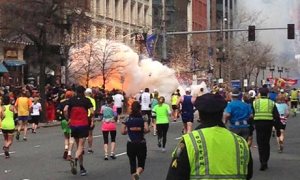The lecture for this week really put a true-to-life application to ethics in media and mass communication and gave me a lot to think about. The Boston Marathon Bombing was an event that brought a lot of attention to social media and the ability to spread information very quickly. According to the lecture, a quarter of Americans found out about the event on social media and more than HALF of young Americans found out this way. A shift in trends for discovering news information should become apparent with that statement. Half of young Americans found out about this tragedy through social media. My, what big power you have social media!
This brings up a few major concerns for me that I will discuss more in depth for my assignment response, but will mention them here. (Appropriately) First, is the issue of accuracy and wanting to report stories as quickly as possible. As the lecture pointed out, CNN actually sent out an inaccurate tweet regarding the detainment of a suspect in relation to the bombings. That tweet received more ReTweets than the correction tweet that later followed it, bringing up questions about the ability for false information to quickly spread in these types of situations. Justin (@newsleader) asked us if a solution that forced corrected Tweets to automatically be ReTweeted by anyone who shared the false tweet was a good solution, and personally, I think it is not. The problem with that is it would give too much power to the ReTweet. While this might be a good idea for news organizations, what about people looking to advertise a sale? Why not “correct” a tweet that got good engagement so that you can reach that same large audience again? Too much power.
The second issue that I have is with the idea of maintaining an appropriate level of privacy in these types of situations. We were asked if the picture of a man who lost his leg in the bombings being Tweeted was appropriate. Personally, in this scenario, I think it is but only on news “stations” that are known for their non-apologetic pictures; and even then, I might consider blurring out the person’s face. Hiding these types of details regarding the violence of an act only censors the issue and de-sensitizes the American public to harshness of violence. Imagine if pictures of civilians that are killed as a result of our drone attacks in other countries were to be more public; maybe some more oversight would be demanded by Americans. In cases like sexual abuse however, I do favor not sharing the identity of victims. Very case-by-case subject there.
Finally, the issue of “capitalizing” on these types of situations arises. While I don’t find this practice unacceptable, I do think it is in bad form. Just because everyone is looking, doesn’t mean you need to take advantage of that. It just further perpetuates the short attention span of Americans by trivializing important issues while they are popular. Maybe the Ford tweet would have been more appropriate on the 1 year anniversary for example.


Thanks a lot Jake. Re Ford. Yes, I think people might have been more forgiving about the message if it was posted a year on. Re correcting tweets. I envisage the functionality being granted to verified news organisations. I can see how it could be misused. Thanks for pointing it out.